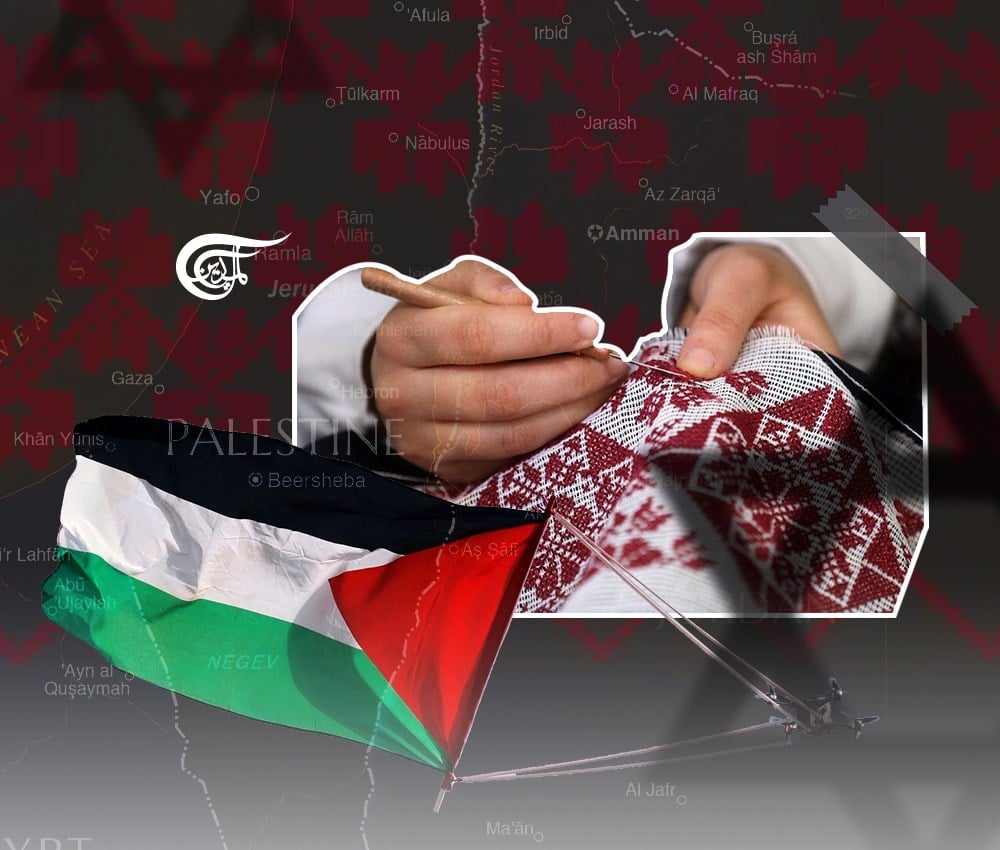The art of Palestinian embroidery that the Israeli colonizer appropriates
Tatriz embodies the Palestinian identity and depicts a mysterious, bohemian, and warm feeling of joy, splendor, and elegance.
The most popular artistic expression in the culture of the native Palestinian Arab-Semitic people is embroidery, known in Arabic as tatriz. The classic reddish color of embroidery comes from the purple color of Phoenician Canaan. Palestinian embroidery is also related to the ancient mosaics of Jericho.
The fact that this traditional and cultural aspect still lives on is thanks to the Palestinian peasant woman who preserves and weaves this transmission to the rest of the nation.
The central garment of the tatriz is the long female dress, called tob. Each region of Palestine has its particularity, and everyone says, "The tob of my region is the most beautiful." There are contests and parades that are almost a procession, both in Palestine and in the diaspora itself. It is a hallucinating overflow of embroidery, which ignites the Palestinian identity. It is a visual poem that caresses us and is also incendiary, a joy in the collective fire and in the intimate and solitary. Yes, and from the solitary, I was in my Venezuela under several weeks of rage, typical of all political activism, which is difficult and stubborn, when one night, I went through my own collection of Palestinian embroidery, coffee amphorae, old keys from "Galilee" and "Jerusalem", and other amulets. I wore an old tob, I placed a wide tatriz on the floor, I tucked myself in with other tob, and I placed the other objects on top of me. I wanted to protect my difficult activism for Palestine. It was my intimate ceremony. Many Palestinian women have their solitary rituals. I met in Jordan a young Palestinian guy who showed me his collection; bags of embroidery, broken and dirty embroidery, he had among other very small very old pieces. One can feel the simplest mysticism between the young man and the tatriz.
My Palestinian peasant mother, a survivor of Al-Nakba, was a weaver and sold her products in Ramallah. She once told me that "Going to Ramallah was like going to Paris... Ramallah was beautiful." The tatriz embodies the Palestinian identity and depicts a mysterious, bohemian, and warm feeling of joy, splendor, and elegance.
There are old women who only wear tatriz; it is used in special events such as wedding parties, engagement ceremonies, school graduations, political marches, dinner parties, special events, and in daily life, such as going to pick olives.
In Ramallah, an old Palestinian woman told me: "Embroidery is like writing." Perhaps, the tatriz is another code of manuscripts and parchments, a metaphor of an other arabesque without ink, with thread and needle, spinning our Palestine. Another old woman from "Nazareth" told me: “The threads are the veins and viscera of the Palestinians, and that every time the needle is buried in the fabric, it is to cling, to be enrooted in our land that these Europeans want to steal from us."
There are those who, at times of calls for political unity, exclaim: "Let us be like our tatriz, a united fabric." And it has become more recurrent among the Diaspora and historical Palestine to feel in the same fabric... as a form of survival in the face of Palestinicide suffered since 1948.
The tob is complemented by the classic hood bordered with old coins and/or a shawl. There are also tapestries of crosses and embroideries that weave a picturesque story in which they capture the fiery typical Arab dance, the Dabke. Also recreated are the harvesting of orange trees, the making of bread, the grinding of pepper and oregano, the fermentation of yogurt, and the olive tree, a symbol of Palestine, among others.
Over time, it began to embroider the key, the symbol of the Return of the Palestinian Refugees forcefully expelled from their homeland by Israeli colonialism. Subsequently, it obtains its organic handmade evolution as it expands to cushions and tablecloths. It is even incorporated into the upholstery applied to olive wood. It expands to various objects such as book holders, bookmarks, glasses holders, key holders, bags, and a cumulus of other objects.
The value of the tatriz for the Palestinian people can be measured, for example, in the context of divorce disputes. Also in the declaration of inheritance, the collection of the tatriz is included in the will.
It was and is frequent to agree to go to someone's house to weave in groups. The weaving takes place between coffee, tea, sweets, chard cupcakes, stories and testimonies, songs, gossip, laughter, and quarrels.
It is common to see a woman, especially an old woman, on a balcony, under a grape bush or an olive grove or in the living room of the house weaving.
For decades, there have been popular tatriz cooperatives that generate an entire economic source. In the Palestinian refugee camps, this work operates and is an economic resource; however, in some cases, they are exploited, as they are very poorly paid.
There was a period, especially in Gaza, with the rise to power of the Palestinian religious party, Hamas, when the tatriz was set aside as a garment and replaced by Islamic attire. The tatriz schools, together with historians and artists, have revived the tatriz as a national banner.
Today the tatriz is omnipresent in the Palestinian sentiment; it is a cultural and national flag; its importance lies in its symbology and imagination. Embroidery is the conductor of a collective feeling. It is another bastion of resistance and survival. Palestine, after the imposition of "Israel's" colonial regime, became a forbidden people, and that is why its cultural identity per se becomes subversive. In view of this situation, Palestine has applied to UNESCO to be declared a Palestinian Intangible Cultural Heritage of Humanity.
The colonial regime of "Israel" appropriates the Palestinian art, the tatriz. It appropriates the millenary history of the native Semitic-Palestinian people, pretending to be the ancient Hebrew people. It appropriates the culinary and many cultural expressions of the native Palestinian people. Doing this is proof that the Jews are not a nation, as they move to usurp the history and culinary and cultural expression in general of the native people in order to pass themselves off as a nation.
The "Israel" that was imposed by Europe and Europeans in 1948 in Palestine is classic colonialism; it is a colonial anachronism today in our XXI century. It is the worst form of colonialism in the history of humanity because it has the particularity of being colonialism that does not come from a nation as in classic colonialism, but rather, it comes from a movement that seeks to colonize and disguises itself as a nation, and that is why it not only usurps the homeland of the native but also usurps its history and its culinary and cultural expression as well.
In classic colonialism, the colonizer takes the native's homeland and in broad strokes destroys its history and cultural expression. In classical colonialism, the colonizer never appropriates the history and culinary and cultural expression of the native people since they, the colonizers, have their own history ad culinary and cultural expression. Furthermore, to do so would be an offense as colonial supremacy; it would be degrading. A Spanish colonial never said he was a descendant of the magnificent and mystical Mayan civilization.
In past times, in the face of the barbarism and obscurantism of colonialism, the colonizer was presented as the symbol of greatness, honor, and glory. Destroying the culture and history of the colonized was an act of purification whereby the beast is destroyed. Today, colonialism is a disgrace, and this is why the colonialism of the Euro-Zionist movement appropriates the history, cuisine, and cultural expression of the native people to hide its colonial nature and roots in Palestine.
Every time the colonial regime of "Israel" vociferates that falafel or hummus is the traditional dish of that regime, it is proof that they are not a nation. The Israeli is not an Israelite; every time they say that they are the ancient Hebrew people, that is proof that they are not a nation. Every time they say that the tatriz is an Israeli tradition, it is proof that they are not a nation, and that they must do this theft to disguise their genocidal colonial anachronism against the native Arab-Semitic, Canaanite, Palestinian people who resist and refuse to disappear.

 Susana Khalil
Susana Khalil
 8 Min Read
8 Min Read












